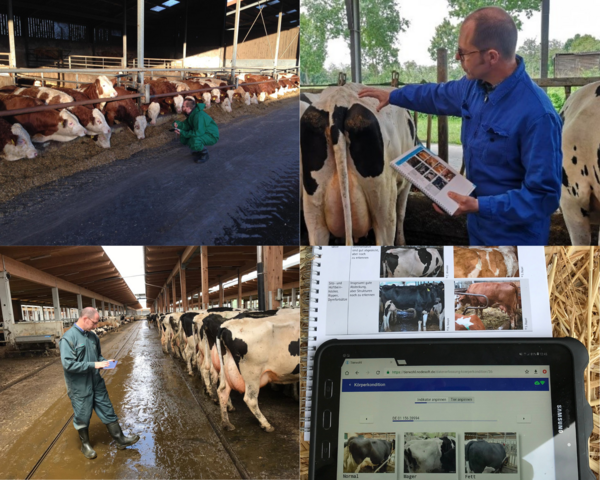Management tools
Online services and tools
Livestock farmers are challenged in their daily business and have to manage many different tasks. In doing so, focusing on animal welfare (including the health status of the animals) is crucial.
To support livestock farmers, the Thünen Institute has created helpful guidelines, web applications, e-learnings, and other tools for farm animal husbandry in several projects.
These tools can help to assess the animal welfare status of e.g. dairy cows or dairy goats etc. by using objective animal-based indicators on a regular basis and to classify the results.
Possible applications for these tools:
- Farm-specific management - inspired by the motto of Peter Drucker ‘if you can´t measure it, you can´t manage it’ - regular animal welfare assessment in the own herd enables to identify and improve weaknesses. Also by facilitating pasture parasite control in cattle, goats and sheep and by supporting decisions regarding the castration of piglets.
- On-farm self-assessment of animal-based welfare indicators according to German Animal Welfare Act § 11 (8): A systematic and regular assessment of animal-based indicators is intended to ensure that the animals are kept and given care according to their needs required in §2 of the Animal Welfare Act (TierSchG 2006). An on-farm self-assessment can be integrated within the farm-specific management.
- National animal welfare monitoring. A national monitoring could reflect the status and the development of animal welfare in livestock farming in Germany.
A selection of tools is available in the following:
Tools
Can you check the animal welfare of your dairy herd at a quick glance? This service is offered by the Q Check-Report. Based on relevant indicators, selected aspects of animal welfare can be evaluated using data already available from the milk recording (example Q Check).
The Q Check-Report is available to all farms participating in the milk recording scheme.
Current nationwide evaluations can be found at Q Check-Monitoring. The new DLQ Guideline 2.1, the data privacy concept, fact sheets and a short explanatory film are compiled at the info desk.
Since February 2014, in addition to daily routine inspections, livestock farmers should check the welfare status of their animals regularly and systematically within the framework of on-farm self-assessment (Animal Welfare Act § 11(8)). Therefore, they have to use animal-based indicators (termed ‘Animal Welfare Indicators’). This should ensure, that the requirements of § 2 Animal Welfare Act are met.
The aim of the project „Eigenkontrolle Tiergerechtheit (EiKoTiGer)“ was to test the feasibility of the guideline for on-farm self-assessment (cattle, pigs and poultry), furthermore to develop an online training course, assessment tools for data recording and reference values, which helps to classify the results.
Guideline for self-assessment
- Animal Welfare Indicators for dairy cows (free pdf download)
- Animal Welfare Indicators for calves (free pdf download)
- Animal Welfare Indicators for beef cattle (free pdf download)
Further Downloads:
- Online-training course: The aim of the freely available online training course is to enables participants to learn to use the indicators in a standardised way and to apply them in the stable. The course includes exercises with an integrated feedback function and an online test (with certificate in case of a positive result).
- Excel-Application: supports data recording in a digital way. The tool provides an automated calculation and a summary of the results at farm level.
- Data record sheets for paper-based recording in the stable. Data record sheets for dairy cows dairy cows, calves und beef cattle
- Reference values: Farmers can compare their results with target and alarm values (based on expert opinions) and thereby determine, if action to improve animal welfare on their farm is needed.
Within the project Tierwohl-Check , the preliminary work from ‘Q Check’ and ‘EiKoTiGer’ was brought together. A Web-Application (https://m.tierwohl-check-sh.de/) for an easy assessment of animal welfare indicators was developed and is available in Schleswig-Holstein.
The tool supports a quick on-farm analysis of animal welfare by providing automatically data from the database of the Schleswig-Holstein Milk Recording Association (indicators from ‘Q Check’ and ‘HI-Tier’).
In the stable, users only have to add the ‘EiKoTiGer’ indicators. The web application leads the user through the assessment. Since the herds data has already been imported by the interface to the milk recording data, the assessment of the cows is easy by selecting the individual cow’s number (or name) and by clicking on illustrated buttons for the different indicators.
A freely available e-learning with several modules on the content of the indicators used in the web application was developed to allow a reliable assessment of the animal welfare indicators in the stable.
The market for German goat milk is growing, and along with it farmers' need for practical information and management tools.
Stable Schools - an innovative advisory concept for dairy goat farming – can be a useful tool to support (goat) farmers by learning from each other. The guideline to assess the welfare of dairy goats is intended to serve as a tool for dairy goat farmers, advisors and veterinarians to assess and to improve animal welfare on farms.
In grazing ruminants, gastrointestinal parasite control is crucial for animal health. Proactive pasture management has proven to be an effective measure against pasture parasites.
All steps and measures that are relevant are shown in the decision tree ´young stock´ / ´suckler cows´ / ´sheep´/ ´goats´.
An Excel-Application serves as a decision tool for piglet producers in Germany to estimate the costs of surgical piglet castration under anesthesia.
With little effort, farmers on conventional farms can estimate the costs of the three methods of piglet castration (surgical castration under a) inhalation anesthesia [isoflurane], b) injection anesthesia [ketamine/azaperone], and c) local anesthesia [procaine]).







